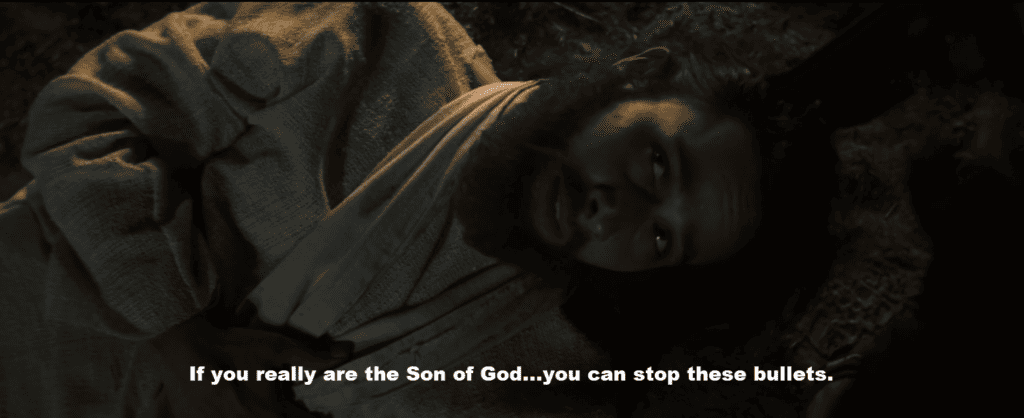Last Updated on April 28, 2023
Black Easter (2021)
Director: Jim Carroll
Stars: Morgan Roberts, Ilsa Levine, Lamar Usher, Gerardo Davila

IS THERE A PLOT?
Young genius Ram Goldstein accidentally invents time travel, only to see his scientific breakthrough immediately stolen by Muslim terrorists who want to go back 2,000 years and murder Jesus Christ. (Spoiler alert: Jesus dies.)
WHAT’S THE DAMAGE?
After so many years doing this, it’s rare that a movie manages to surprise me with its insanity, so let us give thanks for the miracle that is BLACK EASTER. There’s just something so special about watching a film made for Christian audiences where their Lord and Savior is executed at point blank range by a special forces mercenary who says this line:

With its twisty time traveling and absolutely bonkers plot, Black Easter is like a a two-hour episode of Rick and Morty meets Veggie Tales—now with 75% more blasphemy! Whether it was done with good intention or not, there’s a lot of bad decision-making on display here, especially when it comes to some of the offensive stereotypes at work. Combine that with the hammy acting, confused writing, and lackluster production values, and you have a final product that is wildly entertaining. And while it’s plenty bad on its own, a little context about the history of Black Easter really moves it to the upper echelon of B-movies.
For starters, the film was originally released in 2020 under the title ASSASSIN 33 A.D. Writer-director Jim Carroll—whose impressive resume also boasts careers as a professional poker player, private investigator, bounty hunter, reality TV producer, and CEO of multiple Texas businesses—conceived of a spiritual sci-fi movie that could entertain and inspire Christian audiences. Unfortunately, the initial response to ASSASSIN 33 A.D. instead focused on how dark and impossible-to-follow the complicated time travel plot was, as well as concerns about the film’s stereotypical, potentially racist portrayal of certain minority characters, including the Muslim terrorists (almost all of whom are played by Hispanic actors).

A year later, Carroll retooled his film and released a simplified director’s cut as Black Easter, which somehow ends up being four minutes longer. I haven’t seen the original ASSASSIN 33 A.D., but I can definitely see how the multiple timelines and different versions of characters could be confusing to its intended general audience. However, Carroll wildly overcorrected with his cut of Black Easter, almost to the point of parody.
To dumb down the time travel shenanigans, Carrol added title prompts that continually tell you which timeline and characters you’re following, as well as unnecessary amounts of cheesy narration. And not just the occasional voiceover to provide context to a scene—no, you get freeze frames and arrows pointing to new characters anytime they’re introduced and constant “Hey, remember this from earlier…” recaps that assume all audience members must have learning disabilities. (Just imagine if Primer or Donnie Darko had their main character interrupt the movie to give you Cliffs Notes.) Carroll also uses the narrator to fix that pesky Islamophobic problem, mainly by having him blatantly say, “Don’t be judgmental or hating on Muslims. Ahmed is an extremist. There’s a big difference!”
It all makes for a tremendously bizarre, hilarious experience.

You know you’re in for a treat when, instead of the traditional opening credits, the movie kicks off with a showcase of all the awards it’s received from completely obscure film festivals. And Black Easter does not let up from there. The first few minutes are an absolute barrage of information and setup: A contemplation on the ethics of time travel set against several minutes of random stock footage, an honest-to-God “Hey, that’s me! You’re probably wondering how I got here…” introduction to the main character, and finally a montage chronicling the central love story—that was clearly a bigger subplot in the original film but is whittled down to 30 seconds here. It’s exhausting and exhilarating.
The film’s hero, Ram Goldstein, is the self-declared smartest person alive; so smart, in fact, that he discovers time travel by accident. Even with that high-level intellect, though, Ram does not realize that his mysterious benefactor, a billionaire with the actual name Ahmed Akbar, is really the front man for a Muslim terrorist organization. (Ram’s excuse? Ahmed constantly tells everyone that his parents were killed by extremists, which makes it unfathomable that he would ever turn in to one himself.) With this newfound technology, Ahmed immediately sends a team of mercenaries to go back to biblical time and murder Jesus Christ before he can be resurrected, preventing Christianity from ever existing. The team is led by a decorated American war hero whose family recently died in a car accident and now has a personal vendetta against God.
What follows is a mind-bending, head-scratching race to stop Ahmed through multiple time continuums, as Ram and his crew bounce back and forth between the past, present, and future, creating new realities and different versions of themselves. This is actually where Black Easter sort of works, managing to be a pretty decent time travel movie. There are some cool ideas attempted and Carroll clearly put a lot of thought in to it. Unfortunately, effort is wasted as everything manages to somehow feel both overly convoluted and made for toddlers, at least in this version.

What doesn’t work as well? Pretty much everything else. You won’t believe some of the things that happen in this movie:
- Reality star Heidi Montag, who my wife tells me was on The Hills, shows up literally for two lines…which she delivers in a British accent. (In case this was unclear, Montag’s husband immediately looks at her and straight up says, “Your British accent…”) Thankfully, she immediately dies in a fiery car crash after less than a minute of screentime.
- For anyone who attended Sunday School, Black Easter proves its street cred by wasting a lot of time reverse engineering scenes from the Bible. Some are obvious and some are real deep cuts. Like this verse from Mark 14:51: “A young man, wearing nothing but a linen garment, was following Jesus. When they seized him, he fled naked, leaving his garment behind.” If you didn’t know this, you may be super confused as to why our hero takes off his shirt AND his pants to use as a tourniquet when his girlfriend gets shot and hast to spend the rest of the film in his underwear.
- Ram’s “best genius friend” Simon, the film’s only black main character, gets transported to the Garden of Gethsemane and meets Jesus in a scene that is as touching as it is problematic. Simon warns the Son of God that the Romans are ”going to put the hurt on you” and claims he knows this because Simon “watched his bootleg movie.” To make this even more amazing, Jesus (played by American Idol finalist Julian Castro) speaks English and understands modern references, including not only the concept of a movie, but Arnold Schwarzenegger’s most famous line from The Terminator.

- The future we see after Jesus is murdered—referred to as “a world without forgiveness”—is a post-apocalyptic hellscape that for some unknown reason is populated by mutant zombies.
- The villain’s ultimate evil plan? Time traveling inside Jesus’ tomb, hanging out with his dead body, and waiting with glowsticks and a machine gun to kill the disciples when they show up for the resurrection. This eventually leads to the amazing line: “Someone from the future was here! There are glow-sticks everywhere!”
- In fact, Black Easter is a non-stop showcase of just absolutely terrible dialogue, like the main character telling his dying friend, through tears, “I’m sure Jesus has a place for you in Heaven. It’s probably a frat house with lots of beer and sexy angels.” Or the hero getting ready to make his final stand to save the future and dropping this all-time one-liner: “Time for my own resurrection.”

At the end of the day, Black Easter is still a faith-based movie, with the preachy moral messaging that you’d expect. But I have to say, if more Christian inspirational films featured blasphemy, murder, and characters who have to literally be crucified to find their faith again, I could bcomee a convert. Also, amongst the movie’s ten different endings, there’s a ludicrous tease for a sequel that I genuinely pray happens.
“BEST” PARTS
ENJOYABLENESS CONTINUUM

PLAY ALONG AT HOME!
Take a shot or drink every time:
- Jesus gets shot in the head
- The movie uses stock footage
- Something is inherently racist, offensive or blasphemous
- Someone gives a monologue talking to God
- Someone falls to their knees crying
- Time rewrites itself
- You think the movie is ending, but it’s not
Double shot if:
- Jesus knowingly quotes THE TERMINATOR
Seen a movie that should be featured on this column? Shoot Jason an email and give him an excuse to drink.


































Follow the JOBLO MOVIE NETWORK
Follow us on YOUTUBE
Follow ARROW IN THE HEAD
Follow AITH on YOUTUBE